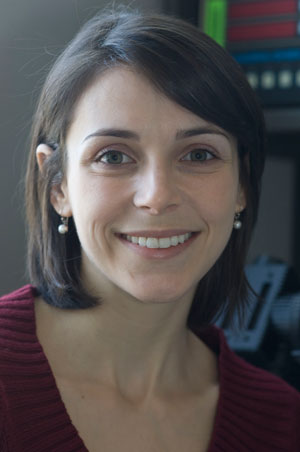EECS professor and MTL core faculty member Dana Weinstein is the recipient of an Intel Early Career Faculty Honor from the Intel Corporation. The announcement was made official this week.
 The Intel Early Career Faculty Honor Program provides financial and networking support to those faculty members who are early in their careers and who show great promise as future academic leaders in disruptive computing technologies. The purpose of this Program is to help promote the careers of promising early career faculty members and to foster long-term collaborative relationships with senior technical leaders at Intel.
The Intel Early Career Faculty Honor Program provides financial and networking support to those faculty members who are early in their careers and who show great promise as future academic leaders in disruptive computing technologies. The purpose of this Program is to help promote the careers of promising early career faculty members and to foster long-term collaborative relationships with senior technical leaders at Intel.
Dana Weinstein is the Finn Assistant Professor in the Department of Electrical Engineering and Computer Science at MIT, and a member of the Microsystems Technology Laboratories. Dana received her B.A. in Physics from UC Berkeley in 2004, where she worked on ultra-fast X-ray physics at the Advanced Light Source. She then moved to Cornell University, where she completed her Ph.D. in Applied Physics in 2009, working on RF Micro Electro-Mechanical Systems (MEMS). Dana is the recipient of the NSF CAREER Award, the DARPA Young Faculty Award, the Intel Early Career Award, and the IEEE IEDM Roger A. Haken Best Paper Award.
The HybridMEMS Lab led by Weinstein focuses on the development of hybrid MEMS-IC devices for low-power wireless communication, microprocessor clocking, and sensor applications. In particular, they are working to harness the benefits of acoustic vibrations to enhance the performance of next-generation electronic devices. Using novel transduction mechanisms like FET sensing, the group has shown the highest frequency resonators to date in Si (~40 GHz) and resonators with f.Q products >5e13.
The lab is also pursuing integration of such hybrid devices into CMOS-based systems, including low-power, narrow-bandwidth low noise amplifiers for transceivers and low phase-noise oscillator arrays for clock generation and temperature sensing in microprocessors. Using Acoustic Bragg Reflectors and dielectric transduction in solid-state acoustic resonators, the lab has eradicated the need for costly packaging, improving yield and robustness in harsh environments, and making MEMS resonators more accessible for a wide range of applications.
-- Patsy Sampson, EECS; Mara Karapetian, MTL; 9/9/2012